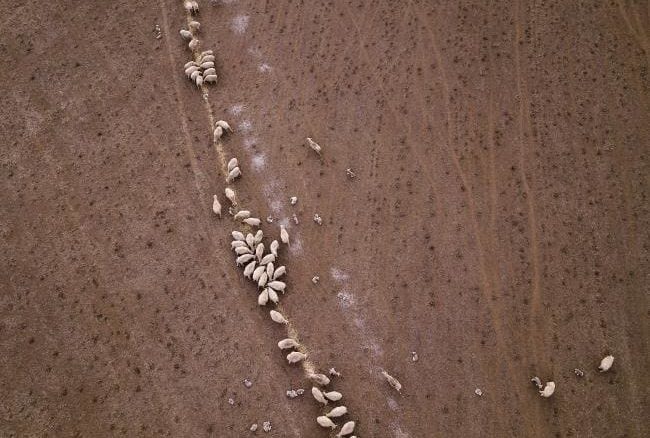
Australia’s crippling drought, which blankets massive swathes of the country’s farming areas, has touched the nation with cash support – big and small – coming to the rescue of those hardest hit.
Millions of dollars from the Federal and State governments, bolstered by significant but much smaller amounts from concerned Aussies via a myriad of schemes, including such things as hay convoys, dress up days and eating chicken parmigiana, have all shown stricken farmers they are not forgotten by the rest of Australia.
While not every farmer is on his or her knees, there is no doubt that far too many are experiencing extreme hardship which has impacted their mental health as they battle to put food on the table and are forced to kill stock as they sink further into debt.
These food producers and others on the brink of following them into extreme hardship were the focus of the Federal Government on Sunday when the Prime Minister announced a $190m relief package which includes up to $12,000 in cash payments and a boost for mental health services.
Mr Turnbull said: “You put the food on our tables, the fibre that goes on our backs and we have your back.”
He described some farmers’ situations as diabolical and tragic, as they battle dry conditions across large areas of eastern and southern Australia.
The new relief comes after the government in June extended the Farm Household Allowance scheme from three to four years.
The government is also changing the assets test to allow an estimated 8,000 more farmers to access support to recognise the severity of the drought.
Under the complex federal-state drought arrangements, which many in the media and beyond misunderstand, the Commonwealth is responsible for family support and the states for fodder and transport subsidies.
But how much difference the Commonwealth package will make is unclear.
Dairy farmer Ashley Gamble, from near Toowoomba in Queensland, is frightened about the future.
He said $12,000 might put food on the table for his children, but would go nowhere on the farm because it was less than the cost of a load of grain or hay.
“I wouldn’t wish this on anyone,” Gamble told the Nine Network on Sunday. “It’s like you are in jail every day. You turn up here because you’ve got to turn up. It’s just depressing.”
Mr Turnbull defended the figure, promising to monitor the situation given grave forecasts of drought continuing through spring and summer.
“We are dealing with a dynamic situation. There’s no set and forget here,” Turnbull said.
Meanwhile, some of those farmers who have so far managed to survive (so far) the worst consequences of the drought, are lamenting that the the media was focusing too heavily on drought disaster stories that are damaging the reputation of Australia’s livestock industry.
They also say the majority of farmers are not shooting their animals or letting them starve in paddocks.
In recent weeks, stories profiling farmers struggling to feed stock, often showing underweight sheep or cows or even dead livestock, have been headline stories across Australia.
“In the media at the moment all you seem to see is busted cockies with starving animals. I don’t know if that is a great reflection of what is happening out there,” Scone farmer Adam Williamson said.
“These are times where there’s a lot of judgment on people not doing the right thing, and I don’t think the industry wants to be tarred with such a brush.”
Almost 100 per cent of New South Wales is either in drought, on drought watch or experiencing the onset of drought, while 57 per cent of Queensland is classified as in drought.
Mr Williamson, who has been experiencing dry conditions for two years, said many in Queensland and New South Wales had planned for drought and destocked early, while also setting aside reserve fodder or grain.
“It’s sometimes a hard thing [to plan early] but that is business and that is the same for everybody across the board. It’s just that in this instance animals’ lives are being impacted,” he said.
New South Wales Agriculture Minister Niall Blair cautioned farmers and the media for only focusing on negative stories during drought, as it could risk Australia’s reputation abroad as a sustainable and viable meat-producing nation.
The risk is when we walk out the door in an international market to say ‘We are all good, we can do that, we can meet that demand’ and then one of our competitors walks in and says ‘Hang on, did you see what they said last week about their conditions?’
“I’m not dismissing the fact we are in a dire situation for drought, but I also know we have some of the most resilient farmers and we have farmers that have put plans in place to be able to meet that demand.”
SheSociety is a site for the women of Australia to share our stories, our experiences, shared learnings and opportunities to connect.

Leave a Reply